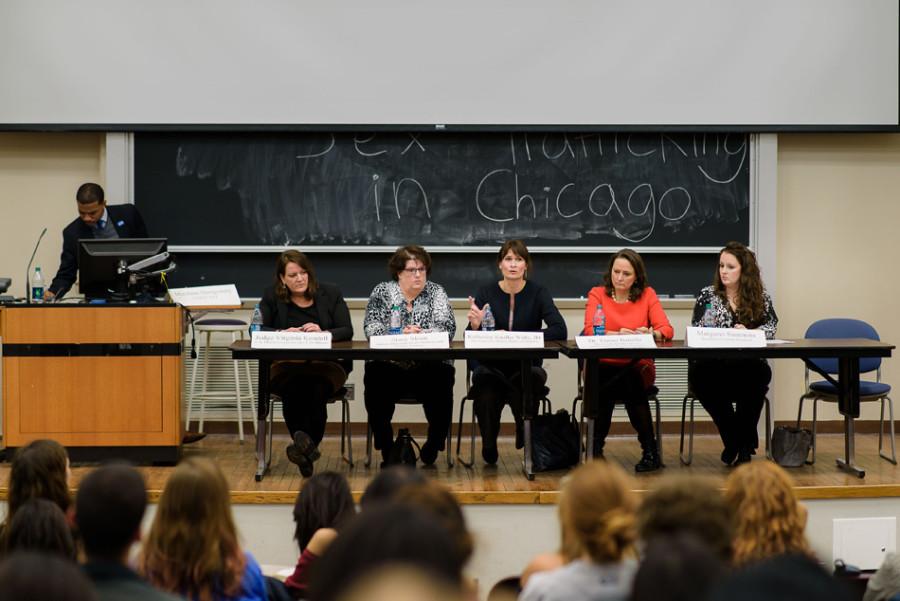Panel discusses human trafficking at home, abroad
Five panelists discuss human trafficking in Fisk 217 on Wednesday. The panel examined trafficking on an international scale before zooming in on Chicago’s struggles with the issue.
February 5, 2015
A five-person panel discussed the scope of human trafficking Wednesday, drawing more than 150 people to Fisk 217 for a discussion of the problem at home and abroad.
The panel, “Sex Trafficking in Chicago,” was organized by five campus groups. The event addressed human trafficking’s presence internationally before discussing Chicago’s struggles with the issue.
Marshaun Montgomery, who works at UNICEF’s Chicago office, moderated the event. He opened the panel by describing the reach of human trafficking: a $32-billion industry that includes some 5.5 million children worldwide.
Its reach extends to the United States and Chicago, Montgomery said.
“Many of you may think that this happens in Thailand or South America,” he said. “The reality is that human trafficking happens in all 50 U.S. states.”
Tianne Bataille, a lawyer and anti-human trafficking advocate, said Chicago is a trafficking hub largely for financial reasons.
“Where there’s money, there’s economic incentive, and this is where human traffickers can fill business,” Bataille said. “This isn’t a crime of passion. It’s about what they can get away with and how much money they can make.”
Bataille also said Chicago’s place as a national transportation hub — with its two airports, Union Station and interstate highways — contributes to its trafficking problem.
Another factor is Chicago law enforcement’s priorities, said Virginia Kendall, a federal district judge in northern Illinois. She said with the city facing a gun violence epidemic, officers are less focused on human trafficking and more on shootings.
Stacy Sloan, human trafficking coordinator at Illinois Department of Children and Family Services, said the state’s financial woes have made it difficult for her department to address trafficking fully. She said private organizations are essential to alleviating the issue, especially in rural Illinois, where fewer groups exist relative to the greater Chicago area.
Nationally, Kendall said, human trafficking advocates are fighting a legal battle. Laws that classify some child sex trafficking victims as “juvenile prostitutes,” and courtroom rules that make it difficult for prosecutors to admit expert witnesses in trafficking cases are among the largest legal hurdles.
The panel was originally supposed to be two separate panels: one hosted by the Global Engagement Summit and International Gender Equality Movement and one hosted by NU Model United Nations, UNICEF NU and Fight for Freedom.
SESP junior Carly Pablos, an iGEM co-president, said the decision to merge was to prevent the groups from hosting redundant events.
“We did want to reduce the amount of overprogramming,” she said. “That is a very big issue at Northwestern, where people have events on very similar topics and they end up not being well-attended, even if the speakers involved are really high-profile.”
Weinberg junior Kriti Goel, a co-president of UNICEF NU, said the organizers asked the panelists to provide some “practical steps” for students to get involved.
Katherine Kaufka Walts, a panelist and director of the Center for the Human Rights of Children at Loyola University Chicago, said students who want to affect change can approach human trafficking academically and close “research gaps.”
“What will move policy is strong data,” she said during the panel, “so more empirical evidence to support what our survivors are saying.”
Bataille encouraged students to scrutinize corporations and their use of human trafficking victims in their supply chains, telling attendees to research how the products they’re buying are made.
Kendall also commended the handful of men in the room — 27 by her count — for attending the five-woman panel, saying it’s important for both genders to be included in addressing this issue.
Email: [email protected]
Twitter: @Shane_McKeon


